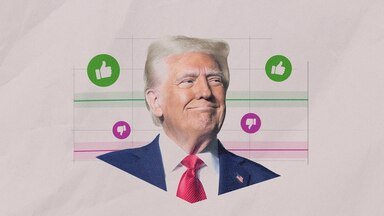Recent polling data reveal a notable decline in President Donald Trump’s approval ratings, signaling growing public dissatisfaction across multiple key policy areas. As of April 25, 2025, Trump\'s net approval rating has fallen to -7.4%, marking one of the sharpest downturns in his presidency since his return to office. Analysts attribute this drop to a convergence of factors, including mounting concerns over economic instability, heightened geopolitical tensions, and controversial policy decisions.
In particular, Trump\'s handling of the economy—once considered a cornerstone of his political strength—has come under increasing scrutiny. Rising inflation rates, coupled with uncertainty triggered by aggressive tariff policies and ongoing trade disputes, have contributed to a more pessimistic economic outlook among voters. Business leaders and consumer groups alike have voiced concerns about slowed growth and investment hesitations, eroding public confidence in the administration\'s economic management.
National security issues have further compounded the president’s approval woes. Recent escalations in international conflicts, criticisms over diplomatic strategies, and debates surrounding U.S. military involvement abroad have led to divided opinions among both policymakers and the electorate. Critics argue that Trump’s approach has been overly confrontational, while supporters maintain that a strong stance is necessary to protect American interests. Nevertheless, polling trends suggest that a majority of respondents are growing uneasy with the administration’s current trajectory.
Political analysts note that approval ratings are often volatile and can be influenced by a variety of external events. However, the breadth of dissatisfaction across traditionally supportive demographics—including older voters and rural communities—indicates a potentially deeper erosion of the president’s political base. As Trump’s campaign gears up for the 2026 midterm elections, addressing these concerns will likely become a top priority for his team. The coming months will be crucial in determining whether this downturn represents a temporary dip or a more lasting shift in public sentiment


















Fausta
Oooh
Polina
Hmm
Suhuyini
Okay
Adungchaab
Can you imagine
hossman
ok